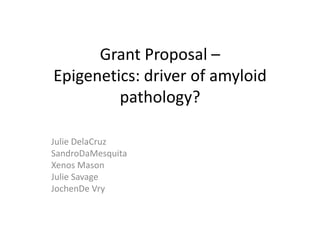
Savage
- 1. Grant Proposal – Epigenetics: driver of amyloid pathology? Julie DelaCruz SandroDaMesquita Xenos Mason Julie Savage JochenDe Vry
- 2. Background • Age-related increases in DNA methylation in humans • AD patients show reduced DNA methylation • DNMTs/HDACs may be involved in cognitive decline, changes in learning & memory • Parallels methylation patterns in AD mouse models
- 3. Research questions • Are epigenetic changes responsible for altered Aβ deposition?
- 4. Epigenetic changes • Environmental influences: negative (chronic mild stress) AND positive (enriched environment) … • … induce epigenetic changes • Do these epigenetic changes accelerate or delay Amyloid deposition and memory performance? • Wild-type and AD model
- 5. Aim 1 - Chronic Mild Stress (CMS) • 3 weeks CMS (Cuadrado-Tejedoret al., J Alzheimer Dis. 2012) in young (3m) and old (12m), wild-type and APP/PS1 mice • Examine epigenetic markers in different brain regions (hipp, EC, PFC, cerebellum) select brain region with biggest differences in epigenetic state • Selected brain region:ChiP focus on genes involved in epigenetic regulation, validate with qPCR • Examine identified gene(s) (up- or down-regulation) by overexpression or RNAi - functional assay check alterations in brain pathology and cognitive performance
- 6. Aim 1 - Enriched Environment (EE) • 3 weeks EE (Fischer et al., Nature 2007) Increased Histone-tail acetylation • Similar approach to CMS
- 7. Aim 2 – Epigenetic manipulation • Focal up- or down-regulation of HDAC2 in selected brain region (Aim 1) mimic EE • Electroporation HDAC2-siRNA-plasmid,HDAC2- plasmid, or scrambled plasmid • After 3-4 weeks: memory performance, IHC (check pathology) • Young (3m) and old (12m) – wild-type and APP/PS1
- 8. Aim 3 – Comparative human epigenetics • Familial cases AD, sporadic AD, age-matched ctrls brain bank and/or collaboration • IHC: HDACs, DNMTs, HATs • Specific brain region: FISH or RT-PCR for candidate genes Aim 1
- 9. Timetable Start End Enriched Environment HDAC2 up/down regulation (Aim 2) Human study (Aim 3) (Aim 1) Chronic mild stress (Aim 1)
- 10. Budget • Aim 1: $65,000 – Animals: EE and stress 2 x 2 x 2 x 12= 96 animals $15,000 – CHiP, reagents,…: $50,000 • Aim 2: $38,000 – Animals: $15,000 – Consumables: $10,000 – Stimulator: $13,000 • Aim 3: $50,000 – Consumables: $50,000 • 2 PhD students = 6 years * $30,000 = $180,000 • Total: $333,000
- 11. Output • 4 papers!!! • Paper: EE • Paper: CMS • Paper: HDAC2 up/down regulation • Paper: human study
